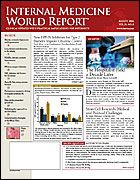Publication
Article
Internal Medicine World Report
Appropriate Condom Use Can Prevent HPV Infection in Young Women
Author(s):
What Is the Physician's Role in Ensuring Patients' Sexual Health?
New England Journal of
Medicine
A considerable amount of evidence has already demonstrated that condoms can help prevent transmission of HIV infection and, among men, gonorrhea. But data on the prevention of other sexually transmitted diseases (STDs), including human papillomavirus (HPV), have been equivocal until now. Results of a new study published in the (2006;354:2645- 2654) demonstrate that consistent condom use dramatically reduces the transmission of male-to-female genital HPV infection.
Although many physicians may feel uncomfortable discussing sexual issues with their patients, addressing prevention measures in the clinical context can have significant impact on stopping the increasing spread of STDs, and their severe sequelae, in this country and worldwide.
Included in this study were 82 female university students (aged 18-22 years) who had their first intercourse with a male partner either during the study or in the 2 weeks before the study began. The women recorded information on their daily sexual behavior twice a month in electronic diaries and underwent regular laboratory testing.
The 12-month cumulative incidence of first HPV infection after first intercourse was 37.2%. Results showed the risk of becoming infected increased as the frequency of condom use decreased.
Women whose partners always used condoms in the previous 8 months were 70% less likely to become infected with HPV than women whose partners used condoms <5% of the time.
"Even women whose partners used condoms more than half the time had a 50 percent risk reduction, as compared with those whose partners used condoms less than 5 percent of the time," write Rachel L. Winer, PhD, Department of Epidemiology, University of Washington, Seattle, and colleagues.
As shown in the Table, similar trends emerged when the data were analyzed according to high- and low-risk HPV types, as well as the HPV types included in the newly licensed HPV vaccine. Thus, the authors note, even for those who have received the HPV vaccine (Gardasil), "consistent condom use by their partners may protect women against infection with other high-risk types of HPV that put them at risk for cervical cancer."
IMWR
"I know the CDC is reviewing the results for their new STD treatment guidelines (to be released some time in August, I think)," Dr Winer told .
"I would say the take-home message is that when used consistently, condoms can offer significant protection against HPV infection (and other STDs). Since they are not 100% effective against HPV, vaccination will be important for age-eligible women, and continued Pap smear screening is important for all women," she added.
The authors of an accompanying commentary (pages 2642-2643) remind physicians that "the promotion of condom use needs to be part of a more comprehensive approach to risk reduction, often referred to as the ABC approach (abstain, be faithful, and use condoms)."
The commentators note that although sexually active patients "can be reassured that condom use can reduce the risk of most STDs?condoms work only when they are used." They conclude that "only by harnessing all the evidence-based prevention tools can we move toward true sexual health."






